The Tornados were an English instrumental rock group of the 1960s that acted as backing group for many of record producer Joe Meek's productions and also for singer Billy Fury. They enjoyed several chart hits in their own right, including the UK and U.S. No. 1 "Telstar", the first U.S. No. 1 single by a British group. Today Dave Watts has his own version.

Ronald Wycherley, better known as Billy Fury, was an English singer, musician, songwriter, and actor. An early star of rock and roll, he equalled the Beatles' record of 24 hits in the 1960s and spent 332 weeks on the UK chart. His hit singles include "Wondrous Place", "Halfway to Paradise" and "Jealousy". Fury also maintained a film career, notably playing rock performers in Play It Cool in 1962 and That'll Be the Day in 1973.
"Blue Moon" is a classic popular song written by Richard Rodgers and Lorenz Hart in 1934. This may be the first instance of the familiar "50s progression" in a popular song, and it has become a standard ballad. Early recordings included those by Connee Boswell and by Al Bowlly in 1935. The song was a hit twice in 1949, with successful recordings in the U.S. by Billy Eckstine and Mel Tormé.

"Wondrous Place" is a song written by Jeff Lewis and Bill Giant and first released by American singer Jimmy Jones on his debut album Good Timin' in May 1960. English singer Billy Fury released a version as a single in September 1960.
The Vernons Girls were an English musical ensemble of female vocalists. They were formed at the Vernons football pools company in the 1950s in Liverpool, settling down to a sixteen strong choir and recording an album of standards.

"Halfway to Paradise" is a popular song written by Carole King and Gerry Goffin. In the United States, the song was originally recorded in 1961 by Tony Orlando where it peaked at No. 39 on the Hot 100. In Canada, the song reached No. 3 in the CHUM Charts.
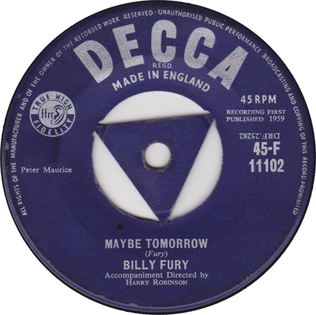
"Maybe Tomorrow'" is a song by English rock and roll singer Billy Fury, released as his debut single in January 1959. It peaked at number 18 on the New Musical Express Top 30.

"I'd Never Find Another You" is a song written by Gerry Goffin and Carole King and first released by American singer Tony Orlando on his album Bless You and 11 Other Great Hits in September 1961.

"Last Night Was Made for Love" is a song by English singer Billy Fury, released as a single in April 1962. It peaked at number 4 on the Record Retailer Top 50.
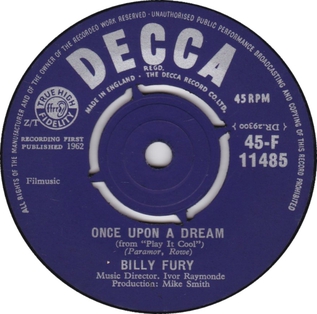
"Once Upon a Dream" is a song by English singer Billy Fury, released as a single in July 1962. It peaked at number 7 on the Record Retailer Top 50.
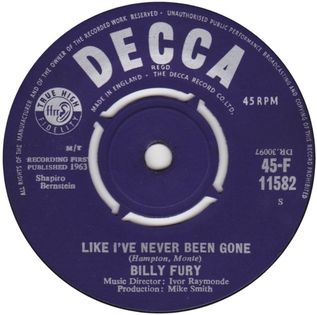
"Like I've Never Been Gone" is a song written by Paul Hampton and Camille Monte and first released by American country singer Chase Webster in July 1962. In February 1963, English singer Billy Fury released a cover of the song which peaked at number 3 on the Record Retailer Top 50.

"When Will You Say I Love You" is a song by English singer Billy Fury, released as a single in May 1963. It peaked at number 3 on the Record Retailer Top 50.
"Because of Love" is a song by Elvis Presley, released on his soundtrack album Girls! Girls! Girls! in November 1962.

"In Summer" is a song by English singer Billy Fury, released as a single in July 1963. It peaked at number 5 on the Record Retailer Top 50.

"Do You Really Love Me Too" is a song written by Mark Barkan and Ben Raleigh and first released by American pop singer Barbara Chandler as the flip side to "I Live to Love" in October 1963. Originally called "Fool's Errand", it was renamed "Do You Really Love Me Too" on the UK release of the single in December 1963.
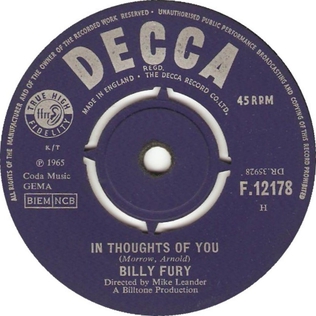
"In Thoughts of You" is a song by English singer Billy Fury released as a single in June 1965. It peaked at number 9 on the Record Retailer Top 50, becoming Fury's final top-ten single.

"Run to My Lovin' Arms" is a song written by Tony Powers and George Fischoff. It was first released as a single by American singer April Young on 30 April 1965. However, it is better known for being released by English singer Billy Fury in September 1965, whose version peaked at number 25 on the Record Retailer Top 50.
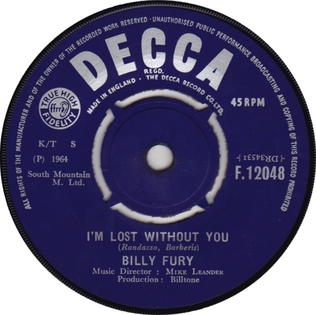
"Lost Without You" is a song written by American songwriters Teddy Randazzo and Billy Barberis and first released by Randazzo as a single in September 1964. It was not as successful as some of his previous releases, only peaking at number 130 on the Billboard Bubbling Under the Hot 100. The song had more success in the UK after it was covered by English singer Billy Fury, who released his version titled "I'm Lost Without You".

"Letter Full of Tears" is a song written by American singer-songwriter Don Covay and released by Gladys Knight & the Pips as a single in November 1961. It became their second top-20 hit, peaking at number 19 on the Billboard Hot 100. The song was covered the following year by English singer Billy Fury who had a minor hit with it.

"That's Love" is a song by English singer Billy Fury with vocal group the Four Jays, released as a single in May 1960. It peaked at number 19 on the Record Retailer Top 50.
















